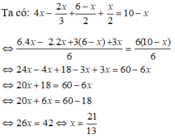x2-4x+6=\(\frac{21}{x^2-4x+10}\)Giải phương trình

Những câu hỏi liên quan
giải phương trình :\(\frac{21}{x^2-4x+10}-x^2+4x-6\)
Giải bất phương trình :
\(\frac{21}{x^2-4x+10}-x^2+4x-6\ge0\)
\(\frac{21}{x^2-4x+10}-x^2+4x-6\ge0\Leftrightarrow\frac{21}{x^2-4x+10}-\left(x^2-4x+10\right)+4\ge0\)
Đặt \(t=x^2-4x+10=\left(x-2\right)^2+6\), ta có điều kiện \(t\ge6\), khi đó \(t>0\)
Phương trình ban đầu tương đương : \(\frac{21}{t}-t+4\ge0\Leftrightarrow t^2-4t-21\le0\)
\(\Leftrightarrow-3\le t\le7\)
Kết hợp với điều kiện \(t\ge6\), ta được \(6\le t\le7\)
Do đó :
\(\frac{21}{x^2-4x+10}-x^2+4x-6\ge0\Leftrightarrow\begin{cases}\left(x-2\right)^2+6\ge6\\\left(x-2\right)^2+6\le7\end{cases}\)
\(\Leftrightarrow\left|x-2\right|\le1\)
\(\Leftrightarrow1\le x\le3\)
Vậy tập nghiệm của bất phương trình đã cho là \(T=\left[1;3\right]\)
Đúng 0
Bình luận (0)
Giải phương trình: \(x^2-4x+6=\frac{21}{x^2-4x+10}\)
\(\Leftrightarrow\left(x^2-4x+6\right)\cdot\left(x^2-4x+10\right)=21\)
\(\Leftrightarrow\left(x^2-4x+6\right)\cdot\left(x^2-4x+10\right)-21=0\)
\(\Leftrightarrow x^4-4x^3+10x^2-4x^3+16x^2-40x+6x^2-24x+60-21=0\)
\(\Leftrightarrow x^4-8x^3+32x^2-64x+39=0\)
\(\Leftrightarrow x^4-x^3-7x^3+7x^2+25x^2-25x-39x+39=0\)
\(\Leftrightarrow x^3\left(x-1\right)-7x^2\cdot\left(x-1\right)+25x\left(x-1\right)-39x\left(x-1\right)=0\)
\(\Leftrightarrow\left(x-1\right)\cdot\left(x^3-7x^2+25x-39\right)=0\)
\(\Leftrightarrow\left(x-1\right)\left(x^3-3x^2-4x^2+12x+13x-39\right)=0\)
\(\Leftrightarrow\left(x-1\right)\left[x^2\left(x-3\right)-4x\cdot\left(x-3\right)+13\left(x-3\right)\right]=0\)
\(\Leftrightarrow\left(x-1\right)\left(x-3\right)\left(x^2-4x+13\right)=0\)
\(\hept{\begin{cases}x-1=0\\x-3=0\\x^2-4x+13=0\end{cases}}\Leftrightarrow\hept{\begin{cases}x=1\\x=3\\x\notin R\end{cases}}\)
Vậy phương trình của tập nghiệm là S={1;3}
Đúng 1
Bình luận (0)
a) Giải phương trình: \(x^2-4x+6=\)\(\frac{21}{x^2-4x+10}\)
b) Giải bất phương trình: \(\frac{4}{1+y+y^2}+\frac{1}{1-y}\)\(\le\frac{2y^2-5}{y^3-1}\)
a, Đặt \(x^2-4x+8=a\left(a>0\right)\)
\(\Rightarrow a-2=\frac{21}{a+2}\)
\(\Leftrightarrow a^2-4=21\Rightarrow a^2=25\Rightarrow a=5\)
Thay vào là ra
b) ĐK: \(y\ne1\)
bpt <=> \(\frac{4\left(1-y\right)}{1-y^3}+\frac{1+y+y^2}{1-y^3}+\frac{2y^2-5}{1-y^3}\le0\)
<=> \(\frac{3y^2-3y}{1-y^3}\le0\)
\(\Leftrightarrow\frac{y\left(y-1\right)}{\left(y-1\right)\left(y^2+y+1\right)}\ge0\)
\(\Leftrightarrow\frac{y}{y^2+y+1}\ge0\)
vì \(y^2+y+1=\left(y+\frac{1}{2}\right)^2+\frac{3}{4}>0\)
nên bpt <=> \(y\ge0\)
Giải phương trình:
4
x
-
2
x
3
+
6
-
x
2
+
x
2
10
-
x
. A.
x
21
13
B.
x
-
21
13
C.
x...
Đọc tiếp
Giải phương trình: 4 x - 2 x 3 + 6 - x 2 + x 2 = 10 - x .
A. x = 21 13
B. x = - 21 13
C. x = 7 13
D. x = 15 13
Giải phương trình x2− 4x + 21 6√2x + 3
Đọc tiếp
Giải phương trình
Lời giải:
ĐKXĐ: $x\geq \frac{-3}{2}$
PT $\Leftrightarrow x^2-4x+21-6\sqrt{2x+3}=0$
$\Leftrightarrow (x^2-6x+9)+[(2x+3)-6\sqrt{2x+3}+9]=0$
$\Leftrightarrow (x-3)^2+(\sqrt{2x+3}-3)^2=0$
Ta thấy: $(x-3)^2\geq 0; (\sqrt{2x+3}-3)^2\geq 0$ với mọi $x\geq \frac{-3}{2}$
Do đó để tổng của chúng bằng $0$ thì:
$(x-3)^2=(\sqrt{2x+3}-3)^2=0$
$\Leftrightarrow x=3$ (tm)
Đúng 0
Bình luận (0)
Giải phương trình : (21/x^2-4x+10) -x^2-4x-4=0
Giải các bất phương trình sau:
a) -2x2 + 7x - 10 < 0
b) \(\dfrac{1+x}{1-x}\) ≤ 2
c) \(\dfrac{x}{x-2}-\dfrac{2}{x-3}\) > 1
d) (x2 + 4x + 10)2 - 7(x2 + 4x + 11) + 7 < 0
giải phương trình x2 -4x+21=6√2x+3




















